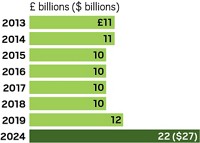Advertisement
Grab your lab coat. Let's get started
Welcome!
Welcome!
Create an account below to get 6 C&EN articles per month, receive newsletters and more - all free.
It seems this is your first time logging in online. Please enter the following information to continue.
As an ACS member you automatically get access to this site. All we need is few more details to create your reading experience.
Not you? Sign in with a different account.
Not you? Sign in with a different account.
ERROR 1
ERROR 1
ERROR 2
ERROR 2
ERROR 2
ERROR 2
ERROR 2
Password and Confirm password must match.
If you have an ACS member number, please enter it here so we can link this account to your membership. (optional)
ERROR 2
ACS values your privacy. By submitting your information, you are gaining access to C&EN and subscribing to our weekly newsletter. We use the information you provide to make your reading experience better, and we will never sell your data to third party members.
Environment
What Kind Of Nation?
by Rudy M. Baum
July 18, 2011
| A version of this story appeared in
Volume 89, Issue 29
What kind of nation do we want to live in? That’s really the fundamental question that underlies the epic debate over raising the U.S. debt ceiling and future budgets.
It’s not about freedom. The citizens of Germany, France, and the U.K.—all nations with social welfare systems that are more developed than that of the U.S.—are as free as U.S. citizens are. They are less free in some ways, more free in others. It balances out. They have better health care; we have more guns. It all depends on what matters to you.
Here is the kind of country we’re moving toward: On June 16, the Washington Post reported that, in order to reduce the deficit, the House of Representatives approved $750 million to fund a food safety law passed by the previous Congress, $205 million less than President Obama had requested and $87 million less than the Food & Drug Administration is currently receiving to guard the nation’s food supply. The House also voted to cut $35 million from the Department of Agriculture’s food safety inspection service.
The
For simplicity’s sake, let’s say there are 300 million U.S. citizens, and they eat three meals and a snack per day. That’s 1.2 billion “eating events” per day, or 438 billion eating events per year. According to the Post, the Centers for Disease Control & Prevention estimates that 48 million Americans get sick from tainted food each year. If we define “safe” as 48 million cases of disease per 438 billion eating events, with 28,000 of those who get sick winding up in the hospital and 3,000 dying, then the nation’s food supply is, in fact, 99.989% safe.
Do you think that this definition of a safe food supply, in which as many people die each year as died in the 9/11 attacks, is adequate?
The June 6 New York Times had an article entitled “In State Parks, the Sharpest Ax Is the Budget’s.” States are closing parks permanently in response to budget deficits. States that previously didn’t charge for entry to state parks now are. Among park officials, the Times reports, “The resignation some feel … is rooted in a broader sense nationwide that the status of parks has permanently changed. … [S]ome officials also worry that rising fees, rising gas prices and a need to ‘market’ parks to people who will spend money will keep those with lower incomes from enjoying public lands.”
It’s so Milton Friedmanesque. There’s no need for government to pay for or offset the costs of common goods and services in this crabbed world. If people want something, they’ll pay for it. If they don’t, they won’t. If they would like to, say, take their kids to a state park but they can’t afford to pay the entrance fee, well, they’re out of luck.
One more example: Last week, the House Committee on Appropriations’ Subcommittee on Commerce, Justice, Science & Related Agencies funded NASA at $16.8 billion in 2012, $1.6 billion below the 2011 budget and $1.9 billion below President Obama’s request. The subcommittee’s bill “terminates funding for the James Webb Space Telescope, which is billions of dollars over budget and plagued by poor management,” according to the subcommittee.
The new telescope (JWST) is a technological marvel that will be 100 times more powerful than the Hubble Space Telescope, which revolutionized our view of the cosmos. An independent review of the JWST program last year concluded that it is about $1.5 billion over its $5 billion budget and one to three years behind schedule. That’s not ideal, obviously, but it’s also not uncommon for projects such as the JWST. Killing the telescope—which is well along toward being built—reflects a lack of imagination and belief in the future of scientific exploration.
The U.S. is not broke. It is still the richest nation on Earth. As a nation, however, we seem to be in the process of losing our faith in the future and unwilling to protect our citizens from bad food and substandard drugs, invest in infrastructure, and continue to advance science. It’s a shame.
Thanks for reading.



Join the conversation
Contact the reporter
Submit a Letter to the Editor for publication
Engage with us on Twitter